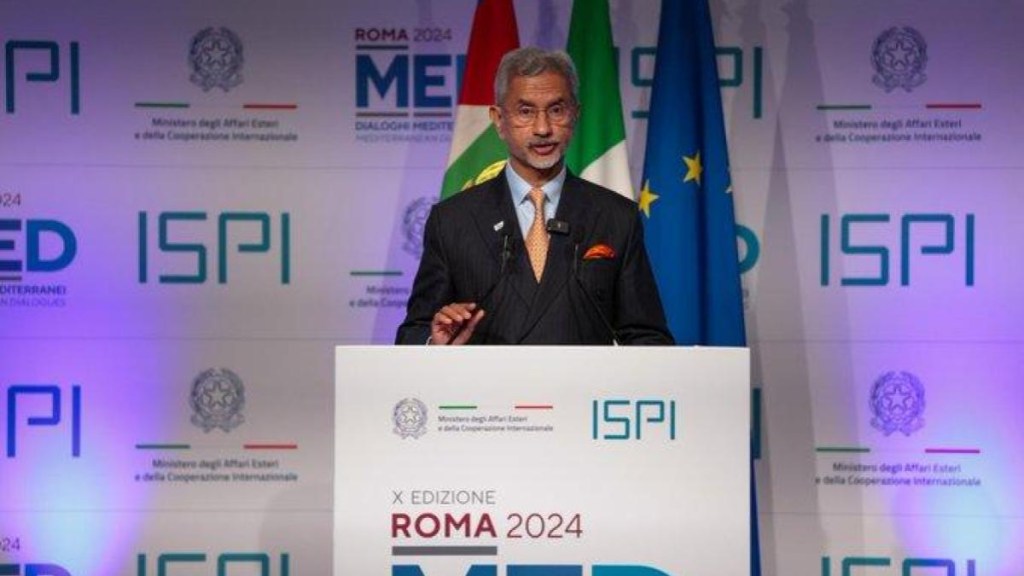India’s diplomatic and economic vision for the future is being reshaped by the India-Middle East-Europe Economic Corridor (IMEC), a transformative project aimed at connecting India to Europe and the Middle East via enhanced infrastructure, trade, and energy pathways. Launched in 2020 and pushed forward under India’s G20 presidency, IMEC has the potential to redefine India’s geopolitical and economic ties with key Mediterranean and Middle Eastern nations.
During his address at the MED Mediterranean Dialogues Conference in Rome, External Affairs Minister S Jaishankar underscored the transformative power of connectivity in shaping global relations. According to Jaishankar, “The new element of our relationship will be connectivity,” highlighting that the India-Middle East-Europe Economic Corridor (IMEC) is poised to be a “game changer” in India’s engagement with the Mediterranean region.
IMEC: A Key Catalyst for Regional Collaboration
The IMEC is set to foster unprecedented cooperation between India, the Middle East, and Europe. As Jaishankar pointed out, “The Mediterranean presents both opportunities and risks in an uncertain and volatile world,” but the development of connectivity through IMEC presents an opportunity to mitigate risks while enhancing economic collaboration. The Minister acknowledged the complications posed by regional conflicts, yet reaffirmed that the project is progressing, particularly in its eastern leg, involving India, the UAE, and Saudi Arabia. “Despite the current conflict in the region, IMEC is proceeding ahead on the eastern side, especially between India and the UAE and Saudi Arabia,” Jaishankar assured.
This corridor, which includes countries such as Saudi Arabia, UAE, Jordan, Israel, and the European Union, aims to integrate trade routes, energy networks, and infrastructure systems, creating a seamless link between these strategically important regions. IMEC’s focus on infrastructure will significantly boost connectivity in transportation, energy, and technology, providing mutual benefits and supporting economic growth.
The Mediterranean’s Growing Economic Relevance
India’s relationship with the Mediterranean has evolved into a multifaceted partnership. Jaishankar highlighted that India’s annual trade with Mediterranean nations stands at around USD 80 billion, with substantial interests in sectors such as energy, technology, defence, and infrastructure. He further highlighted the role of the Indian diaspora in the Mediterranean, with over 460,000 people, 40% of whom reside in Italy. “Our key interests are in fertilisers, energy, water, technology, diamonds, defence, and cyber,” Jaishankar explained, also noting India’s involvement in major infrastructure projects, including the development of airports, ports, and railways, along with green hydrogen initiatives.
This growing economic engagement underlines India’s expanding role in the Mediterranean, particularly in sectors that are central to both regions’ future development. Jaishankar also emphasized the political and defence dimensions of this relationship, stating that “our political relations with the Mediterranean are strong, and our defence collaboration is growing, including more exercises and exchanges.”
The Middle East: A Crucial Strategic Partner for India
India’s engagement with the Middle East and North Africa (MENA) region has been vital, with trade between India and the Gulf Cooperation Council (GCC) alone reaching USD 160–180 billion annually. More than 9 million Indians live and work in the region, which is central to India’s energy needs, technological cooperation, and industrial collaborations. Jaishankar noted, “For these very reasons, you may expect India’s presence and activities to grow, especially as we move from being the fifth-largest economy in the world to the third.”
The deepening ties with the Middle East are part of India’s broader geopolitical strategy, which includes addressing energy security, technology exchange, and enhancing India’s manufacturing and industrial footprint in the region. The Gulf states, including Saudi Arabia and the UAE, are diversifying their economies, opening up opportunities for Indian businesses to partner in these new areas of growth. Jaishankar stated that India’s interests in the Middle East are not just economic but also rooted in historical, cultural, and security ties.
I2U2: Strengthening Collaboration with Israel and the US
In addition to the IMEC, India’s collaboration with Israel, the UAE, and the United States through the I2U2 grouping is another crucial aspect of its Middle East strategy. Jaishankar pointed out that the I2U2 grouping, which focuses on key areas like technology, innovation, and sustainability, will become more active in the future. “I2U2 will become more active in times to come,” he said, highlighting the potential for deeper cooperation in infrastructure development, renewable energy, and defence.
Strategic Benefits of the IMEC for India and its Partners
The strategic benefits of the IMEC are significant not only for India but for the entire region. By strengthening ties with the UAE, Saudi Arabia, and other Mediterranean nations, India enhances its role as a central player in the global economy. The IMEC facilitates trade, technology transfer, and access to critical resources, all of which are essential for India’s continued economic growth and development.
For the Middle East and Mediterranean countries, the IMEC presents opportunities to diversify their economies, reduce dependence on oil, and enhance their technological and infrastructural capabilities. The corridor also creates a platform for addressing broader regional challenges, such as energy security, climate change, and geopolitical stability, by fostering cooperation rather than competition.
India’s Growing Role on the Global Stage
Jaishankar concluded by reiterating India’s growing global role. As the country moves toward becoming the world’s third-largest economy, its increasing influence in the Mediterranean and the Middle East will be critical in shaping future economic and security dynamics. India’s strategic initiatives like the IMEC, coupled with its engagement in the I2U2 grouping, position the country as a key partner in the rapidly changing geopolitical landscape.

